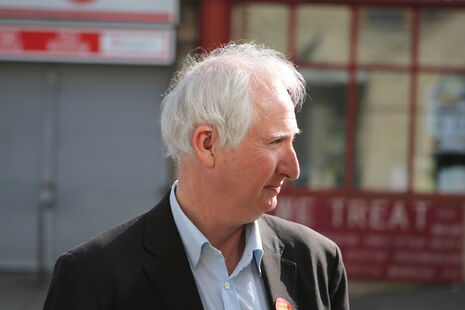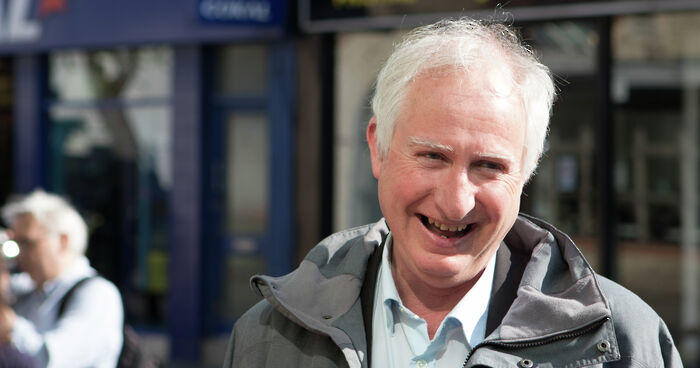
Daniel Zeichner: ‘Jeremy has rediscovered that idealism and hope’
Josh Kimblin speaks to the incumbent Cambridge MP about Brexit, homelessness and party leadership ahead of the election

Daniel Zeichner is a political fighter and, in this election, he is fighting harder than ever.
Having stood for Parliament unsuccessfully on four occasions during his political career, he won the Cambridge seat in 2015 with a slender majority of 599. The snap election has resurrected an old rivalry with another Cantabrigian political heavyweight, Julian Huppert, who represented Cambridge from 2010 - 2015.
Brexit is one of the key battlegrounds for Zeichner vs Huppert II. The Liberal Democrats have castigated Labour’s position as a hard Brexit, something which Zeichner denies.
“I want a soft Brexit – so soft that, to all intents and purposes, it’s not Brexit at all.”
Daniel Zeichner
“I fully accept that my wanting strongly to remain is not exactly in line with the Party leadership,” he acknowledges. “But there is an ongoing debate within the party, especially over single market membership.”
Zeichner argues that “levels of popular understanding were quite low” during the referendum campaign but things have improved lately.
“As people see the costs of a hard Brexit, compared to the benefits of staying close to the EU, we will be able to shift opinion. You’re never going to shift the 30-40% who want a ‘little England’… But I’m an optimist; we can stay, if not in the European Union, at least very close. I want a soft Brexit – so soft that, to all intents and purposes, it’s not Brexit at all.”
Although Brexit and questions over leadership have dominated the national campaigns, my next question addresses a crucial local concern: how would Zeichner deal with Cambridge’s homelessness crisis?
He acknowledges that “street-homelessness brings shame upon us all in a wealthy city” and has a complex range of causes. However, he points out that the Labour government reduced homelessness and that it has risen since 2010.
“Responsibility for that rise lies entirely with the government’s decisions to change the welfare system and remove support services,” he argues. “All the hostels – like Jimmy’s – are under pressure because the benefit cap means they are losing a huge amount of income… Labour will reintroduce those social support measures.”
Addressing another local issue, we turn to tuition fees, which the Labour Party has promised to abolish. Although this is likely to encourage student support, can Zeichner guarantee that university funding would not be adversely affected?
“That’s the very first thing I’ve been saying throughout the campaign,” he explains. “It’s a huge change.”
“When fees were first introduced, I was quite happy with a contribution from students because universities were woefully underfunded… Personally, I’d be happy to return to some contribution. But the money raised by taking corporation tax to its 2011 levels [26%] gives us enough to be able to offer free higher education.”
“It’s just got to be balanced so that it doesn’t short-change universities; I’ve already spoken to Angela Raynor [the Shadow Education minister] on that specific point.”
Winning the student vote is clearly critical to all candidates’ success. However, Cambridge has three broadly left-wing, progressive parties. I ask why a left-wing student should vote for Labour, as opposed to the others.
“I will never prop up a Conservative government.”
Daniel Zeichner
“First, I take issue with your description of the Liberal Democrats as a progressive party,” Zeichner counters immediately. “Look at Tim Farron’s views; they don’t correspond with the views that many people in Cambridge hold.”
Then the gloves come off: “It was curious that he described Guardian readers as hair-shirt, muesli-eating” liberals. It was odd that he had to write a piece defending Trump’s strikes in Syria.”
“The Liberal Democrats joined a Conservative coalition and Julian Huppert voted with the Conservatives 782 times. I will never prop up a Conservative government.”
“The key answer to your question is that Labour has a chance of forming a government. And, even if we don’t form a government, we can be the stand-out opposition.”
Zeichner’s Liberal-bashing response is replicated in his campaign literature, much of which directly attacks Huppert and his legacy. I ask him why he chose to pursue that approach and whether he is concerned about an anti-Brexit, Liberal Democrat resurgence in Cambridge.
“Quite clearly, it was a close election here two years ago,” he responds. “It would be strange if we didn’t address our main opponent in this city.”
“I actually think it’s a three-way split now. In 2015, the Conservative vote was artificially suppressed by a mixture of a candidate having a difficult time and tactical voting to keep Labour out. That might not happen this time.”
Despite the rivalry in Cambridge, would Labour be willing to enter a coalition with the Liberal Democrats?
“If we are the largest party, we will bring forward with a Queen’s speech and invite others to support it,” is the diplomatic response. “That’s very different from a coalition.”
I press him: “Is a Liberal-Labour alliance implausible?”
“I don’t think there will be many Liberal Democrats to ally with, frankly,” he replies. “Even if there were, I wouldn’t touch them with a barge pole.”
Zeichner is equally plain-spoken about Labour’s leadership troubles. Zeichner was not among the 172 Labour MPs who voted no confidence in Jeremy Corbyn less than a year ago. He did, however, back Corbyn’s leadership challengers: Yvette Cooper in 2015 and Owen Smith in 2016.
He is perfectly at ease with this. Acknowledging that “there was a group who were anti-Jeremy from the outset”, he states that “they should have shut up.”
“I believe in party democracy. Over the years, I’ve voted for some leadership candidates who have won and some who haven’t. You then get on with it. As soon as the ballot is finished, you have to do what’s best for Labour and for the country.”
Then Zeichner becomes more reflective. “What [Labour has] experienced is a conversation postponed from 2010. There was a sense of disappointment at the end of the Labour government from people who had hoped for more.”
“I’m a realist - I think it’s hard to deliver real change. But some felt [the previous Labour government] was a touch managerial… So Jeremy has rediscovered that idealism and hope. That’s a good thing.”
Meet the candidates
 Features / Beyond the porters’ lodge: is life better outside college?24 February 2026
Features / Beyond the porters’ lodge: is life better outside college?24 February 2026 News / Cambridge academics sign open letter criticising research funding changes22 February 2026
News / Cambridge academics sign open letter criticising research funding changes22 February 2026 Theatre / Footlights Spring Revue? Don’t Mind if I Do!25 February 2026
Theatre / Footlights Spring Revue? Don’t Mind if I Do!25 February 2026 Fashion / The evolution of the academic gown24 February 2026
Fashion / The evolution of the academic gown24 February 2026 News / Student and union protesters hold ‘Trans Liberation Solidarity Rally’ 24 February 2026
News / Student and union protesters hold ‘Trans Liberation Solidarity Rally’ 24 February 2026












![How to Create an Attractive Freelancer Portfolio [5 Tips & Examples]](https://www.varsity.co.uk/images/dyn/ecms/320/180/2026/02/vitaly-gariev-ho2tNOWZYXM-unsplash-scaled.jpg)
